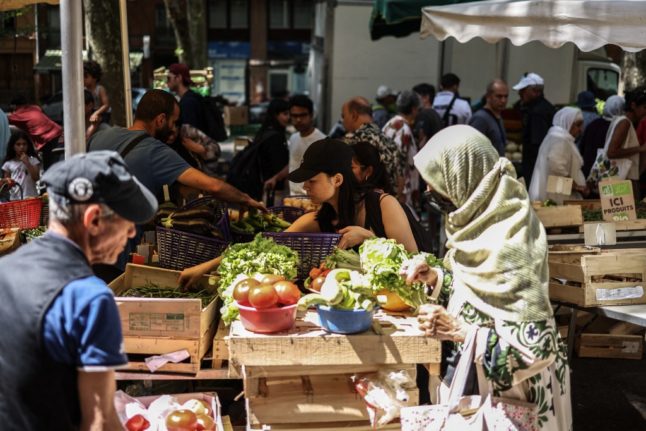Speaking to strangers in France can be daunting, and it can be hard to know which settings are most conducive to small talk.
But this is one of those hurdles that foreigners may need to get over in order to make acquaintances and practice your language skills – if you never talk to French people, then your French will only progress so much.
Foreigners might be nervous to strike up a random conversation with French people, particularly Parisians, because they are often stereotyped as being a little cold.
In reality, French rudeness is usually the result of a miscommunication, particularly when foreigners fail to start off the chat with the essential ‘bonjour’.
There are plenty of scenarios where small talk is perfectly appropriate.
At your local boulangerie
If you are looking for someone with whom you can reliably discuss easy topics, like the weather, then your local boulangerie is a great place to start.
Try going early in the morning, or at times when the bakery is not too crowded, and make it a habit. Be sure to say bonjour when you enter and ask the person behind the counter how they are doing. If you keep this up for a little while, you’ll be sure to have a small talk partner in no time.
While less common than small talk with the baker, if there is a long line outside the boulangerie, people might start to chat amongst themselves. You may also find that many of the people in the line are your neighbours, even if you have never run into them before.
At the marché
Open-air markets exist all over France, including in cities. The people running stands are often excited to share a bit of small talk with a would-be customer, and they may even let you taste some of their fresh fruit. Similar to the boulangerie, the local market is something of a watering hole for a neighbourhood, even in urban areas.
READ MORE: All you need to know about shopping at French food markets
The marché is a great place to practice your grocery-related French vocabulary, and if you go consistently, you will start to notice familiar faces.
In a small(er) towns
On the one hand, bigger French cities are have the benefit of being very multicultural, with activities for everyone. But like with cities everywhere, they are more anonymous, with people coming and going.
In smaller towns, or sometimes even neighbourhoods in a large city, you have a better chance of sitting down at a tabac turned cafe, perhaps after your trip to the market, and striking up a conversation with the other people reading the newspaper. They may remark upon your accent, and ask how you came to be in France, which is a winning start to a bit of small talk. This crowd tends to be a bit older, but that can mean they have more time on their hands to chat.
In a taxi or Uber
While there is less of an expectation to make conversation to the taxi driver in France as there might be in the United States, you should still start off the ride with a polite bonjour and ça va?
You can ask them how their day (or night) has been going, and from there you can gauge how chatty they are. You may find yourself carrying on with a 30-minute conversation all in French.
While waiting for public transport during a strike
If you spend any extended time in France, you are sure to have at least one strike experience. Oftentimes, industrial action hits public transport the hardest. You might find yourself in a crowd of people waiting for the same bus or train, and this is your opportunity to join in the best type of French small talk: complaining.
Drop in a mais c’est le bordel! and you are sure to get several nods in appreciation, and maybe a few j’en ai marres.
READ MORE: 12 phrases that will let you complain like the French
At the school gates or the park
If you are a parent of school-aged children in France, then you will be forced to interact with other parents when dropping off or picking up. If you take your child to the park, you might find yourself seated on a bench beside another parent. Resist the urge to look down at your phone and strike up a conversation, after all, you already at least one important topic in common.
When drinking a coffee or beer at the bar
The phrase ‘at the bar’ does not extend to the seated areas across the pub or café, the bar is very literal. In France, many cafés will charge a cheaper rate for coffee or beer drunk while standing up at the bar, and being directly beside the bartender or barista also lends itself to small talk that flows more naturally. That being said, if you are seated at a table, you are much less likely to find a French server looking to engage in small talk than you would in the US or UK.
With your gardien
If you live in a shared apartment building, then your complex might have a gardien. This person manages day-to-day operations in the building, and they are often the one’s to hold onto your packages if they are delivered while you are out.
The gardien is like the glue of the building – if you have questions about what is allowed (perhaps you are curious about barbecuing on your balcony) or if you just want to let someone know you’ll be out of town for a few days, the gardien is the person to seek out.
You will likely pass them several times a week in common spaces, so consider slowing down every once in a while to ask how their day is going.
If you do not live in an apartment building, but you work in a shared office building, you might test this out with the gardien there.
At the hairdresser’s or barber’s
It seems that across all cultures, a haircut is an ideal time for a light chat. If you are nervous about your French, bring along some photos of what you have in mind.
Hairdresser’s are used to making small talk, so you won’t feel as much pressure as you might in other situations.
READ MORE: The need-to-know vocab for getting a haircut in France
What about situations to avoid small talk?
There are some moments where small talk is not appreciated in France. The most important thing is to know the right times to strike up conversations, and these tend to be different than what you might be used to in your home country.
READ MORE: Five etiquette tips for taking an elevator in France
The Metro and public transport
It might be appreciated to complain about a delay before getting on the train or bus, but once you are moving, it is quiet time. One of the easiest ways to spot a foreigner in France is to see who is speaking loudly on public transport. There tends to be a lower tolerance for noisy people, particularly in crowded common spaces like buses and trains. Most people pass the time by reading a book or newspaper, or listening to music (with headphones).
When seated at a restaurant or café
This might sound strange to anglophones – primarily north Americans – but when out at a restaurant or bar, French people tend to keep the conversation to the people they are seated with. Expect some surprise if you strike up a conversation with the table next to you.
The doctor’s waiting room
Another example of a silent space – you won’t find French people chatting to one another at the doctor’s surgery. This is seen as a private or intimate location.
In the elevator
Elevators have their own rules of politesse. When you enter, you should say bonjour, and when you exit you should say bonne journée. As for the in-between – expect some awkward silence.
What situations have we missed off this list? We’d like you to share your own experiences of making small talk with the French in the comments section below. You just need to log in to leave a comment and we’ll read them.



 Please whitelist us to continue reading.
Please whitelist us to continue reading.
My greatest success was in a bistrot, reading Margaret Atwood’s La servante écarlate (The Handmaid’s Tale, in French). A bilingual parisienne was fascinated, and came over to ask how far I had got in the book which she had recently finished. “Ah! *there* …” she said. So we ended up with 20 minutes testing both my French and my literary analysis. Reader, I survived.
More generally, I have found that serving staff are more inclined to chat if you are there early, at non busy times of the day.